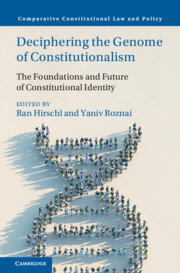Book contents
- Deciphering the Genome of Constitutionalism
- Comparative Constitutional Law and Policy
- Deciphering the Genome of Constitutionalism
- Copyright page
- Contents
- Figures
- Contributors
- Preface
- Acknowledgments
- Introduction
- Part I Foundations, Theory, and Concepts
- Part II Comparative Perspectives
- 8 Confucian Constitutional Identity
- 9 ‘(A-)Religious & Democratic’ Militant Dual Constitutional Identities and the Turn to Illiberalism
- 10 Constitutional Identity in Bangladesh
- 11 Clashing Identities?
- 12 Imposed Revolution?
- 13 India
- Part III American Constitutionalism and Constitutional Identity
- Part IV Emerging Trends
- Index
- References
9 - ‘(A-)Religious & Democratic’ Militant Dual Constitutional Identities and the Turn to Illiberalism
The Case of France
from Part II - Comparative Perspectives
Published online by Cambridge University Press: 14 March 2024
- Deciphering the Genome of Constitutionalism
- Comparative Constitutional Law and Policy
- Deciphering the Genome of Constitutionalism
- Copyright page
- Contents
- Figures
- Contributors
- Preface
- Acknowledgments
- Introduction
- Part I Foundations, Theory, and Concepts
- Part II Comparative Perspectives
- 8 Confucian Constitutional Identity
- 9 ‘(A-)Religious & Democratic’ Militant Dual Constitutional Identities and the Turn to Illiberalism
- 10 Constitutional Identity in Bangladesh
- 11 Clashing Identities?
- 12 Imposed Revolution?
- 13 India
- Part III American Constitutionalism and Constitutional Identity
- Part IV Emerging Trends
- Index
- References
Summary
Using the case of France, this paper seeks to expand Gary Jacobsohn’s concept of “dual constitutional identity” by examining the tensions between the democratic component and the religious component of dual constitutional identities. I argue that constitutional identities are protected by a common set of mechanisms derived from militant democracy: bans/dissolution of political parties, eternity clauses and states of emergency. In the case of dual constitutional identities, militant democracy is used as a tool to protect the state religion from real or imagined threats from religious minorities – doing so in the name of democracy rather than in the name of religion. The democratic trajectory of France illuminates how constitutional identities tying a religious (or secular) identity to democratic principles and giving their courts the tools of militant democracy to police constitutional faith may in fact threaten the very foundations of democracy.
- Type
- Chapter
- Information
- Deciphering the Genome of ConstitutionalismThe Foundations and Future of Constitutional Identity, pp. 113 - 124Publisher: Cambridge University PressPrint publication year: 2024



